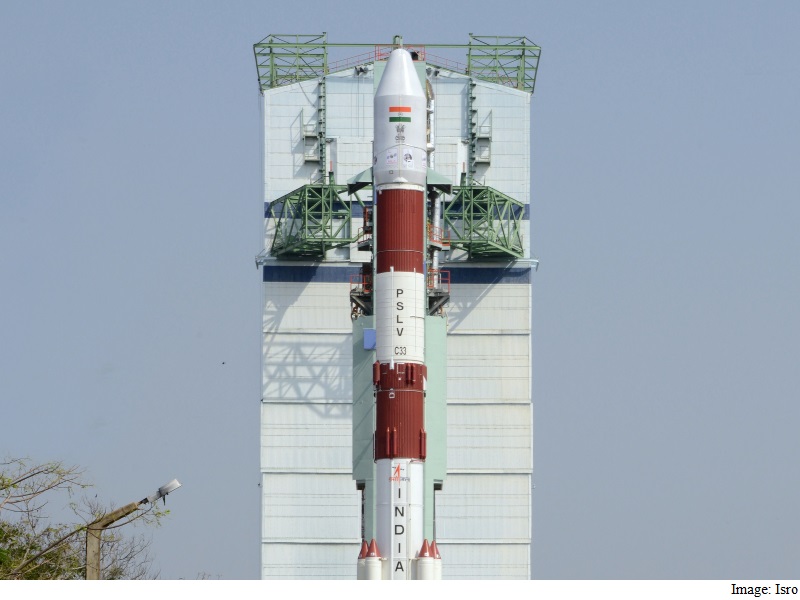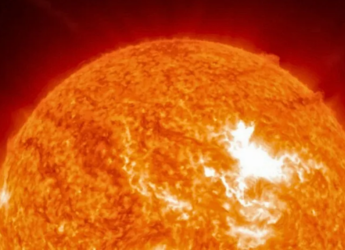- Home
- Science
- Science News
- Countdown to Launch of Isro's Navigation Satellite Progressing Smoothly
Countdown to Launch of Isro's Navigation Satellite Progressing Smoothly

According to the Isro, the progressing status of the countdown for the launch of 44.4 metre, 320 tonne Polar Satellite Launch Vehicle (PSLV) carrying Indian Regional Navigation Satellite System-IRNSS-1G is expected to blast off at 12:50pm on Thursday.
Just over 20 minutes into the flight, the rocket is expected to put into orbit the 1,425-kg IRNSS-1G satellite at an altitude of 497.8km.
The PSLV rocket is a four stage/engine rocket powered by solid and liquid fuel alternatively.
The satellite with a design life span of 12 years has two payloads for navigation and ranging.
The navigation payload of IRNSS-1G will transmit navigation service signals to the users. This payload will be operating in L5-band and S-band. A highly accurate rubidium atomic clock is part of the navigation payload of the satellite.
The ranging payload of IRNSS-1G consists of a C-band transponder (automatic receivers and transmitters of radio signals) which facilitates accurate determination of the range of the satellite.
According to Isro the applications of IRNSS are: terrestrial, aerial and marine navigation, vehicle tracking and fleet management, terrestrial navigation for hikers and travellers, disaster management, integration with mobile phones, mapping and geodetic data capture and visual and voice navigation for drivers.
Apart from the civilian usage, the IRNSS will be used for defence purposes as well.
Till date, India has launched six regional navigational satellites (IRNSS-1A, 1B, 1C, ID,1E and 1F) as part of a constellation of seven satellites to provide accurate position information service to users across the country and the region, extending up to an area of 1,500 km.
Though the full system comprises nine satellites - seven in orbit and two on the ground as stand-by, the navigation services could be made operational with four satellites, Isro officials had said earlier.
Each satellite costs about Rs. 150 crores and the PSLV-XL version rocket costs about Rs. 130 crores. The seven rockets would entail an outlay of about Rs. 910 crores.
If everything goes successful then the entire IRNSS constellation of seven satellites will be completed on Thursday.
The first satellite IRNSS-1A was launched in July 2013, the second IRNSS-1B in April 2014, the third on October 2014, the fourth in March 2015, and the fifth and sixth on January 20 and March 10, 2016.
Once the regional navigation system is in place, India need not be dependent on other platforms.
According to Isro, with the operationalisation of six IRNSS satellites, the proof of concept of an independent regional navigation satellite system over India has been demonstrated for the targeted position accuracy of better than 20 metres over 24 hours of the day.
Get your daily dose of tech news, reviews, and insights, in under 80 characters on Gadgets 360 Turbo. Connect with fellow tech lovers on our Forum. Follow us on X, Facebook, WhatsApp, Threads and Google News for instant updates. Catch all the action on our YouTube channel.
Related Stories
- Samsung Galaxy Unpacked 2025
- ChatGPT
- Redmi Note 14 Pro+
- iPhone 16
- Apple Vision Pro
- Oneplus 12
- OnePlus Nord CE 3 Lite 5G
- iPhone 13
- Xiaomi 14 Pro
- Oppo Find N3
- Tecno Spark Go (2023)
- Realme V30
- Best Phones Under 25000
- Samsung Galaxy S24 Series
- Cryptocurrency
- iQoo 12
- Samsung Galaxy S24 Ultra
- Giottus
- Samsung Galaxy Z Flip 5
- Apple 'Scary Fast'
- Housefull 5
- GoPro Hero 12 Black Review
- Invincible Season 2
- JioGlass
- HD Ready TV
- Laptop Under 50000
- Smartwatch Under 10000
- Latest Mobile Phones
- Compare Phones
- OPPO A6v 5G
- OPPO A6i+ 5G
- Realme 16 5G
- Redmi Turbo 5
- Redmi Turbo 5 Max
- Moto G77
- Moto G67
- Realme P4 Power 5G
- HP HyperX Omen 15
- Acer Chromebook 311 (2026)
- Lenovo Idea Tab Plus
- Realme Pad 3
- HMD Watch P1
- HMD Watch X1
- Haier H5E Series
- Acerpure Nitro Z Series 100-inch QLED TV
- Asus ROG Ally
- Nintendo Switch Lite
- Haier 1.6 Ton 5 Star Inverter Split AC (HSU19G-MZAID5BN-INV)
- Haier 1.6 Ton 5 Star Inverter Split AC (HSU19G-MZAIM5BN-INV)

















